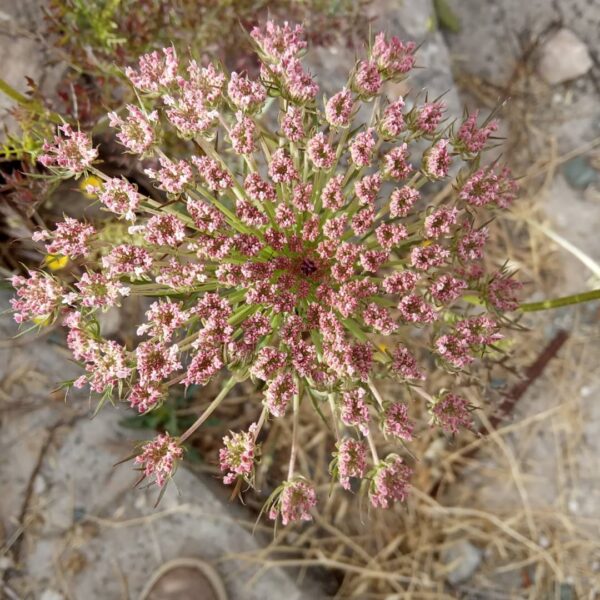Etymology of Daucus carota subspecies carota
"Daucus" is an Ancient Greek word, from "δαῡκος" [dafkos], which means "carrot". "Carota" derives from Ancient Greek as well, from the word "καρωτόν" [karοtōn], which also means "carrot".
The plant in Cyprus
There are nine Daucus species and subspecies in the wild Cypriot habitat.
Daucus carota subspecies carota is an uncommon plant of the wild Cypriot habitat. The plant in the pictures was photographed in Souni village, but it is extremely rare in the Limassol district. It grows at an altitude between 0–1375 metres. Its flowering period is between April and November.
Cypriot names of the plant
'Αγριο καρρότο, Δαύκος το καρότο υποείδος το καρότο
Can wild carrot (Daucus carota subspecies carota) be safely consumed, and in what forms?
Wild carrot is technically edible but requires proper identification and preparation to ensure safety. The young roots, leaves, and seeds of wild carrot can be consumed, with the following considerations:
- Roots: Best harvested in their first year before the plant flowers, as they become woody and tough later. The roots can be eaten raw or cooked and have a mild, carrot-like flavor.
- Leaves: Often used as an herb or garnish, though they may cause skin irritation in sensitive individuals. They should be consumed in moderation due to potential allergenic compounds.
- Seeds: These are aromatic and used sparingly in cooking as a spice.
Proper identification of Daucus carota subspecies carota is crucial to avoid confusion with toxic look-alikes like poison hemlock (Conium maculatum).
How does wild carrot compare to its cultivated counterpart in terms of nutritional value?
Wild carrot (Daucus carota subspecies carota) differs from cultivated carrot (Daucus carota subspecies sativus). Wild carrot roots are smaller, less sweet, and higher in fiber than cultivated varieties. They contain more polyphenols, contributing to higher antioxidant properties. While cultivated carrots are widely consumed as a staple, wild carrots are primarily foraged for medicinal or occasional culinary uses.
What are the medicinal uses of wild carrot?
Wild carrot (Daucus carota subspecies carota) has a long history in traditional medicine, used for its diuretic, carminative, and anti-inflammatory properties.
- Urinary Health: It has been used to treat kidney stones, cystitis, and urinary infections due to its diuretic effects.
- Digestive Aid: It relieves bloating and indigestion and serves as a mild laxative.
- Antimicrobial and Antioxidant: Wild carrot contains flavonoids and phenolic acids, which exhibit antibacterial and antifungal properties, supporting immune health.



